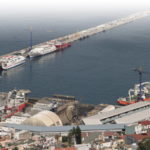Managing Director Richard Beards claims Gibdock to be constantly evolving with the market. This seems to be necessary these days with the unknown consequences of the »Brexit« and the shrinking German fleet, one of the biggest customer bases in the past.
The ship repair and conversion facility at the South-western edge of Europe has traditionally good relations to German shipowners[ds_preview]. »We are close to Algeciras and Tangier as big container ports and a lot of German container vessels are calling these ports, so Gibdock has a good strategic location for them. Our German agent Combitrade did a good job as well to keep our name in the German market,« Managing Director Richard Beards tells HANSA. Although the yard still has strong ties to the German fleet, it saw an effect of its crisis-led shrinking on its business in the past years. But with the offshore business another market came up, bringing a »record month« for Gibdock just recently. »That’s how shipyards work. Offshore is becoming more and more a difficult market now, too, so we look for new opportunities. We are moving and evolving and it is still going well«, he adds. At least from January to April, the ferry business contributes a big share to Gibdock’s work. Some 25 to 30% of the orders are from this segment, especially during its »downtime« at the beginning of each year. One of the new opportunities evolved because of the migrant crisis in the Mediterranean, when more and more military and coast guard vessels were deployed in the region, which needed repair and maintenance, too.
In general, ship repairs are responsible for the biggest share by far. Only 15% is from the conversion business, mostly from offshore projects and ferries which need more people or car capacity.
According to Beards, the influence of the shipping crisis on Gibdock’s business is limited. »The whole industry has got it’s challenges and you can’t be immune to that. But it is very far from problematic for us, our orderbook stretches up to December, which is quite good for a repair yard I would say.« Up to now, he did not see any problems with shipowners not able or willing to pay the bill because of limited liquidity. »That’s one of the things why a local agent is important with the knowledge about who is who and who has financial difficulties,« Beards says. Between 65 and 70% of his work is repeat business, »so we know our customers«.
»A good relationship to customers is very important, but at the time very hard to maintain. Obviously the location of Gibraltar helps,« the manager adds. Competing mainly with Astican on the Canary Islands for West African offshore projects, Navantia Cadiz or Lisnave in Portugal, the place is well-known as being a hub for bunkering, crew changes and supplies, too. In addition, Gibraltar is working on an LNG power station, which could be ready for operation in 2017 – another factor which could contribute to the order book of the yard, if other vessel than before stop there.
Nonetheless, there are no plans to expand the facilities today, because »this might not be right moment for this«. On the opposite, Beards and Gibdock’s owner, the US investment fund MVC Capital, which took over the ownership in 2011, are not averse to inorganic growth. The industry in Europe is facing some challenges of utilization. Some argue more consolidation steps are needed and Gibdock could take a leading role in it. Beards: »Some time ago, it was on the agenda to take over another shipyard. We looked at a couple of transactions, but they weren’t the right fit.« However, he and his partners would still be open and looking for opportunities.
To be present with a second location elsewhere in Europe could become of increasing interest for Gibdock, bearing in mind the still unknown details and consequences of Great Britain’s much-debated exit from the European Union. Gibraltar claims to be very European – about 96 % supported the »Remain« campaign – , but it still is a part of Great Britain. Because the shipyard prices in sterling, the outcome of the negotiations between London and Brussels might have a direct impact on its business. Be it in terms of exchange rates and currency matters or in terms of Gibdock’s ability to act with the reintroduced border and without the advantages of the European Single Market.
»Brexit«? No one knows
In the first weeks after the referendum, which went positive for the ones willing to leave the EU, Beards saw a positive effect: »In the short and medium-term we have the advantage that the value of sterling declined. So when a client is asking us for a quotation, we can be 5 or 10% cheaper than others in the Eurozone. But on the other side, all depends on the exchange rate, so we might be even more expensive that others.« The weaker the sterling, the better for his sales. Regarding the long-term outlook nothing has happened yet, he says. »It is business as usual, that’s our message to the market.«
Michael Meyer





















